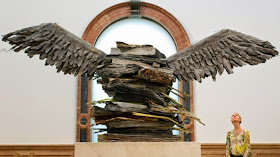 |
|
Anselm Kiefer, The Language of the Birds, 2013
|
It is a pointless exercise (but not unenjoyable) to argue the toss about who might be the 'greatest living artist' - but, for my money, Anselm Kiefer is a contender.
This exhibition at the RA promises much (see Rachel Cooke's review: only with the help of a blindfold would you be able to wander the Royal Academy’s stupendous retrospective of his work and leave feeling anything less than drunk with amazement). Kiefer is nothing if not ambitious both in terms of physical scale and his deployment of materials (lead, steel, straw, clay, copper wire, wood, seeds, sand, ash, oil paint...) and in the cultural richness of his themes. Born in 1945 Kiefer's preoccupation has been confronting the trauma and guilt of Germany's Nazi history - a history which for the post-war generation was effectively suppressed. Kiefer draws on references which include German Romanticism (Caspar David Friedrich), mythology, the Kabbalah, Nazi architecture and the poetry of Paul Celan whose parents perished in Nazi labour camps and who was himself interned. This is serious art. My ticket is booked.
Read reviews by Rachel Cooke, Waldemar Januszczak, Alastair Sooke, Sebastian Smee, John-Paul Stonhard,and Jonathan Jones; read accounts of Kiefer's astonishing 'studio' complex by Michael Prodger and Mark Hudson. (Click on images to enlarge.)
 |
|
Anselm Kiefer, Black
Flakes (Schwarze Flocken), 2006
|
 |
|
Anselm Kiefer, Interior
(Innenraum), 1981
|
 |
|
Anselm Kiefer, Nothung,
1973
|
 |
|
Anselm Kiefer, Operation
Sea Lion (Unternehmen Seelowe), 1975
|
 |
|
Anselm
Kiefer, Osiris and Isis, 1985-87
|
